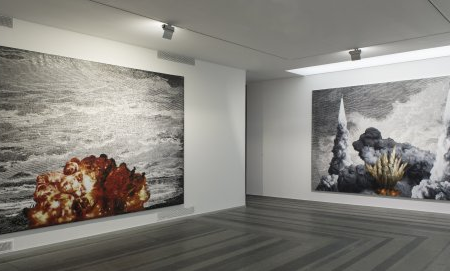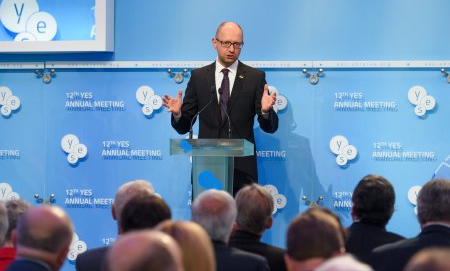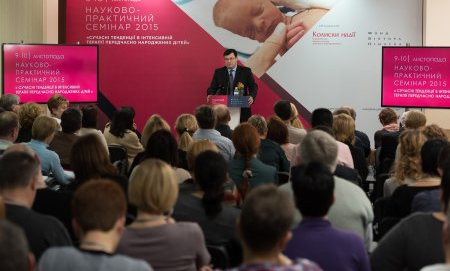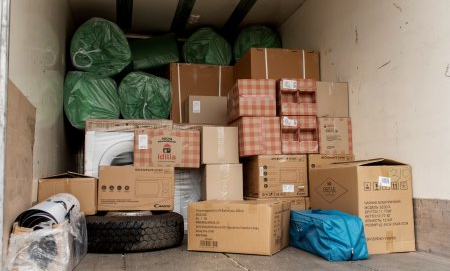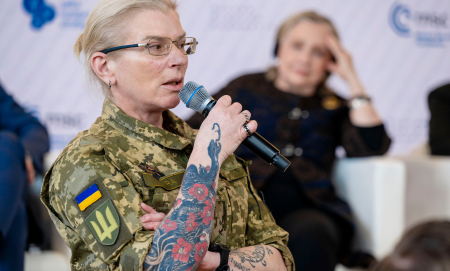News
Victor Pinchuk Foundation hosts Holding Russia accountable: Roadmap for Reparations in Ukraine discussion on the occasion of WEF
On 18 January 2023, the Victor Pinchuk Foundation held the discussion entitled Holding Russia accountable: Roadmap for Reparations in Davos (Switzerland). The event was held within the UKRAINE IS YOU project organized by the Victor Pinchuk Foundation, PinchukArtCentre in cooperation with the Office of the President of Ukraine. The project brought together global thinkers, experts and people from the ground in Ukraine to discuss the assault on the country, Russian war crimes and also the hope and empowerment of defending freedom and independence.
Among the participants of the discussion were Iryna Mudra, Ukrainian Deputy Minister of Justice (online); Patrick W Pearsall, Allen & Overz LLP, Director of the International Claims and Reparations Project at Columbia Law School; Markiyan Kliuchkovskyi, Partner, Asters, Advisor to the Office of the President of Ukraine; Janine di Giovanni, Executive Director, The Reckoning Project; Bruno Cathala, Judge honoraire, former ICC Registrar; Janine di Giovanni, Executive Director, The Reckoning Project. The event was moderated by Kersti Kaljulaid, President of Estonia (2016-2021).
Addressing the panel via a video link, Iryna Mudra came up with a framework to hold Russia accountable for committed crimes in Ukraine. It should be based on three main pillars, she said: “First, the investigation of Russia’s war crimes by the Ukrainian justice system and foreign law enforcement bodies, as well as the investigation and prosecution of war crimes by the ICC. Second, setting up a special tribunal for the crime of aggression against Ukraine to hold Russian top military and political leadership accountable. Third, reparations from the aggressor, including through setting up an international compensation mechanism, beefing up sanctions and confiscation of Russian state assets and sanctioned individuals to repurpose them to cover the damages to victims of Russia’s war crimes and rebuild Ukraine.”
Markiyan Kliuchkovskyi continued speaking about why reparations are inevitable for Russia: “Russia will have to pay reparations to Ukraine. It’s not a matter of whether or if, it’s a matter of when and how.” He added that the General Assembly’s resolution dated 14 Nov 2022 was a road map to follow in this regard.
He also touched upon freezing Russian state assets: “We are not naive; we are also mindful of the fact that reparations are not contingent on Russia’s consent to make them. We look at what’s out there - Russian assets.”
“We want to establish a precedent in a certain way, because we want to show to the world that if a state in the future commits an act like that, it has to face responsibility, it has to lose the assets if it has to come to that,” Markiyan Kliuchkovskyi said.
He also shared his thoughts about the future of international law: “There are only two ways forward - one of them is that international law will fail if we don’t do anything about it; another one is that international law will come out of this more resilient, more robust and stronger.”
Taking the floor, Patrick W Pearsall said: “An international mechanism [on reparations] must be established consistent with the rule of law, consistent with justice that holds a state accountable.”
“I think that Russia will eventually participate in the process of paying reparations, and I think so because if they don’t, then stock markets in New York, London and Paris will be closed to them forever,” he added.
Janine Di Giovanni raised the issue of the lack of political will when it comes to holding an aggressor state accountable: “I see this lack of political will in Syria, Bosnia and in many conflicts in Africa. We are doing our job because we want to keep advocacy alive, we want to keep in the public eye what is going on in Ukraine, so that people get shocked and saddened, which will turn into more action.”
“Vengeance is the most horrible deterrent to keeping peace, to post conflict security…The only way people work through post conflict situations is when they get justice. So let’s give it to Ukraine,” she said.
At the end of the discussion, Iryna Mudra raised the issue of sanctions imposed against Russia: “We do see strong commitment of the EU member states and other countries to implement sanction policy against Russia, Russian companies, and individuals. But we would expect more, we would expect stricter ones, we would expect those that would give real effect, that would have an impact on the course of this war. Because our final goal is to stop the war and our final goal is to make sure that Russia leaves the territory of Ukraine. So far, we are not close to this.”













